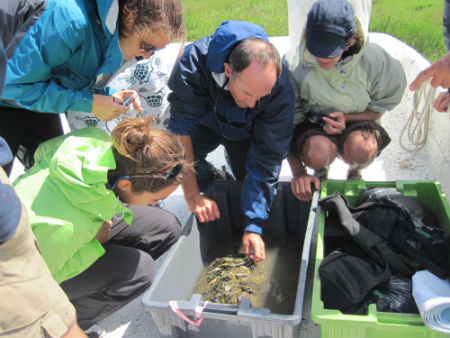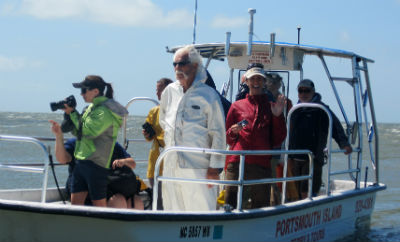
OCEAN — The N.C. Coastal Federation is gearing up again to help produce the next generation of young professionals who will shape research and influence coastal policies and decision-making.
The organization, based in this small community between Morehead City and Cape Carteret in Carteret County, will close the application process for its Coastal Advocacy Institute on Saturday.
Supporter Spotlight
It’s a rigorous summer program of study and hands-on work that exposes students to top academic researchers and administrators, but also gets them out into the muck and mire of the region’s productive but sometimes troubled estuaries.
The federation has had summer interns for more than two decades of its 30-plus years, but the institute, which began in 2011, gives the internship program the structure and rigor befitting a college graduate-level program.
Ana Zivanovic-Nenadovic, the federation’s program and policy analyst, runs the institute and has developed a keen eye for choosing interns. That’s essential, because far more apply than can be accepted.
“We have had between five and 10 students every summer,” she said recently. “We usually have anywhere between 20 and 40 applicants. “It’s very difficult to choose, since we get excellent candidates. The cover letter (for the application) really carries a lot of weight in the selection, as does the relevant experience. Those letters that show that the applicant has made an effort to learn about what we do and what we stand for, and then related that to their own values and skills, are usually the winners in my view.”
The federation promotes the program through different university listings and on its website. Institute graduates are the program’s best recruiting tools, Zivanovic-Nenadovic said, because they return to their colleges and often tell others of their experiences.
Supporter Spotlight
A significant portion of the interns come from Duke University, which has a marine laboratory nearby. The federation has a long-standing relationship with Duke’s Stanback Internship Program, which is funded by Fred and Alice Stanback of Salisbury. The Duke alumni are longtime members, and the organization’s southeastern headquarters in Wrightsville Beach, is called The Fred and Alice Stanback Coastal Education Center.

“We mostly get students within the environmental field – mostly environmental policy, with natural science background,” Zivanovic-Nenadovic said. “The majority are Duke master’s of environmental management students concentrating on coastal environmental management. But we have had a couple of law students and engineering students, as well.”
Though the program is designed for master’s students, the institute has accepted exceptional undergraduates, she explained. Most of the students come from colleges and universities in North Carolina, but several have come from around the country, Zivanovic-Nenadovic said.
In addition to Duke, students have come from UNC-Wilmington, UNC-Greensboro, N.C. State University, Oregon State University, Indiana University, Appalachian State University, the University of Minnesota-Duluth and College of Charleston.
“I try to select those students who have to a certain point decided to dedicate their professional careers to coastal environment,” she explained. “They are usually attuned to coastal issues, and it makes most sense to provide them professional experience in an organization such as the Coastal Federation.”
The interns are responsible for their own housing, and most end up sharing a rental house in the area.
The interns work with federation staff on a variety of projects. They take to the field to help restore marshes or build oyster reefs. They help educate kids and adults on environmental issues. They write reports, analyze and comment on environmental studies and research policy issues. When they’re not busy with all that, the interns attend lectures from staff and coastal scientists and policy-makers.
“We invite many of our partners to talk to our interns about their careers, their expertise and their collaboration with the federation,” Zivanovic-Nenadovic said. “In this way the interns get to learn firsthand from scientists, policy-makers, state and federal agencies and community leaders. This includes talks with our own staff.”
The goal of the program is to give the interns a holistic experience. “They don’t specialize in anything,” she said. “Some take on specific projects, but participate in everything. Their experience is very broad.”

Past projects the interns have done include producing a watershed restoration planning guidebook, calculating stormwater runoff volumes, updating the oyster restoration blueprint and writing official comment letters on fracking and terminal groin proposals.
Most of the students either want to work in the nonprofit field or they are interested in learning about coastal restoration, coastal policy. For some, an internship is a required part of their studies. Zivanovic-Nenadovic said most are passionate about the natural environment when they arrive, but they change while they’re here.
“They usually come in innocent,” she said. “For most of them, policy has only been a theoretical concept they learned about in a class. When they get into the actual world of policy-making, and attend public meetings where policies are made, and realize that the theory is not the practice, and that people make policy, science doesn’t, they’re a bit dumbfounded.”
Most of the students stay in touch after they get their certificate and graduate from in the institute in August.
“Almost all the interns love the program and say they have learned a great deal,” Zivanovic-Nenadovic said. “For some of them it is really a reality check – some go out with different ideas about their future careers and some have a stronger drive.”
The four months they spend with the federation gives the interns a better idea about possible career paths, Zivanovic-Nenadovic said. “We hope that we contribute to the professional development of future coastal managers and leaders who will use the knowledge to make sound decisions for the coastal environment,” she said.
In return, the federation each summer gets a skilled workforce that can help accomplish its goals and programs.
“We also get new eyes that can provide us with new ideas,” Zivanovic-Nenadovic said. “The coastal habitats and waters are the ultimate winners.”
To apply, review the federation’s website to learn more about the organization’s work, and then email a cover letter and a resume to Ana Zivanovic-Nenadovic at anaz@nccoast.org. The cover letter should outline skills and abilities, interest in restoration, advocacy and/or education and the types of projects in which the applicant is interested.







